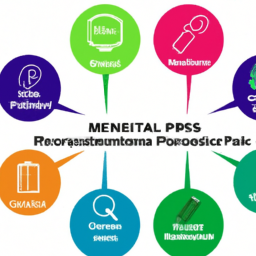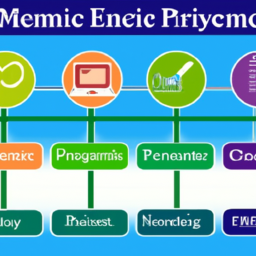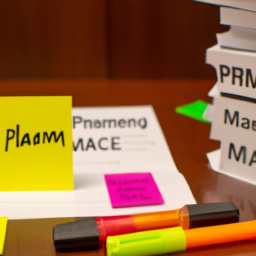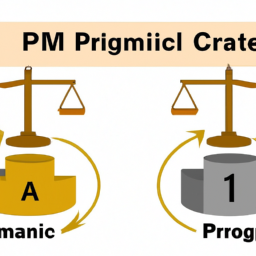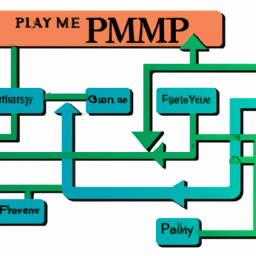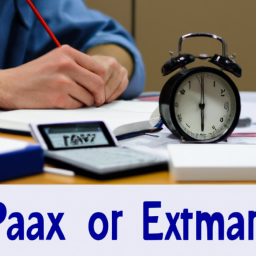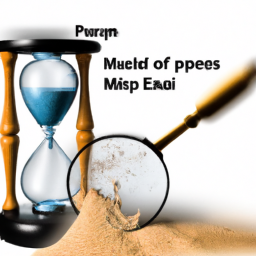Are you ready to take your project management skills to the next level? Look no further than the PMP Exam – your pathway to global recognition.
By successfully completing this rigorous exam, you’ll demonstrate your expertise in the field and open doors to exciting career opportunities.
In this article, we’ll explore the importance of the PMP Exam, the requirements for eligibility, strategies for preparation, and the key knowledge areas it covers.
Get ready to take the leap and boost your professional standing with PMP certification.
Key Takeaways
- PMP Exam demonstrates expertise in project management and showcases dedication to excellence.
- PMP Exam opens doors to career opportunities and increases chances of landing high-level roles.
- PMP Exam provides recognition on a global scale and allows professionals to join a prestigious group.
- PMP Exam offers networking opportunities with experienced individuals and opens up career advancement possibilities.
The Importance of the PMP Exam
You should understand the importance of the PMP exam if you want to achieve global recognition in project management. The significance of this exam cannot be overstated.
It serves as a testament to your knowledge, skills, and expertise in the field. By passing the PMP exam, you demonstrate your ability to successfully lead and manage projects of all sizes and complexities.
This recognition can open up numerous opportunities for career advancement. Many organizations worldwide value the PMP certification and actively seek professionals who possess it.
With the PMP certification, you can stand out from the competition and increase your chances of landing high-level project management roles. It is a valuable asset that showcases your dedication and commitment to excellence in your career.
Exam Requirements and Eligibility
To be eligible for the PMP exam, you must meet certain requirements. These requirements ensure that you have the necessary experience and knowledge to successfully pass the exam and become a certified project management professional.
Here are the key eligibility criteria you need to fulfill:
-
Obtain a secondary degree (high school diploma, associate’s degree, or global equivalent) and have at least five years of project management experience, with a minimum of 7,500 hours spent leading and directing projects.
-
Hold a four-year degree (bachelor’s degree or global equivalent) and have at least three years of project management experience, with a minimum of 4,500 hours spent leading and directing projects.
-
Complete 35 hours of project management education.
-
Submit the PMP exam application and pay the required exam fees.
Strategies for PMP Exam Preparation
Developing effective strategies for PMP exam preparation can greatly increase your chances of success. When it comes to studying for the PMP exam, it’s important to have the right study techniques and manage your time effectively. Here are some strategies to help you prepare:
| Study Techniques | Time Management |
|---|---|
| Take practice exams | Create a study schedule |
| Review study materials | Set specific study goals |
| Join a study group | Prioritize your study time |
| Use flashcards or mnemonic devices | Eliminate distractions |
| Seek guidance from a PMP professional | Take regular breaks |
Key Knowledge Areas Covered in the PMP Exam
The key knowledge areas covered in the PMP exam can greatly impact your chances of success. To ensure you’re well-prepared, it’s important to understand the content that will be tested.
The PMP exam covers a wide range of topics related to project management, including:
-
Project Integration Management: This knowledge area focuses on coordinating and integrating all aspects of a project to ensure its successful completion.
-
Project Scope Management: This area involves defining, managing, and controlling the project scope to meet the stakeholders’ expectations.
-
Project Time Management: Time management is crucial in project management, and this knowledge area covers activities such as scheduling, sequencing, and controlling project activities.
-
Project Risk Management: This knowledge area deals with identifying, analyzing, and managing risks that may impact the project’s objectives.
To effectively study these areas, it’s essential to have reliable study materials that cover all the necessary content. Make sure to choose materials that align with the PMP exam syllabus and provide comprehensive coverage of these key knowledge areas.
Benefits of PMP Certification for Global Recognition
When pursuing a PMP certification, you’ll gain recognition on a global scale for your expertise in various areas of project management. This certification not only demonstrates your commitment to professional development but also opens up a world of opportunities for career advancement.
With a PMP certification, you become part of a prestigious group of project management professionals who are recognized and respected worldwide. The PMP certification is highly regarded by employers and can give you a competitive edge in the job market.
Additionally, being a certified PMP provides you with networking opportunities with other professionals in the field, allowing you to expand your professional network and learn from experienced individuals.
Overall, obtaining a PMP certification can significantly enhance your career prospects and provide you with the recognition and opportunities you deserve.
Frequently Asked Questions
What Is the Passing Score for the PMP Exam?
The passing score for the PMP exam is not disclosed by the Project Management Institute (PMI), the organization that administers the exam. However, it is important to note that the score is not based on a percentage or a fixed number of correct answers.
Instead, it is determined by a complex algorithm that takes into account the difficulty level of each question. To be eligible to take the exam, you must meet certain criteria set by PMI, such as having a certain amount of project management experience.
Are There Any Prerequisites or Experience Requirements to Be Eligible for the PMP Exam?
To be eligible for the PMP exam, you must meet certain prerequisites and experience requirements.
These prerequisites include a secondary degree (high school diploma, associate’s degree, or global equivalent) along with 35 hours of project management education. Alternatively, you can have a four-year degree or global equivalent, along with 35 hours of project management education.
In addition to the education requirements, you also need to have a minimum of 4,500 hours of project management experience if you have a secondary degree, or 3 years/36 months of project management experience if you have a four-year degree.
How Long Is the PMP Exam Valid for Once You Pass?
Once you pass the PMP exam, the validity of your certification is for three years. This means that for three years, you can proudly showcase your PMP credentials and enjoy the benefits that come with it.
After the three-year period, you will need to participate in the Continuing Certification Requirements (CCR) program to maintain your certification. The CCR program ensures that you stay up to date with the evolving field of project management and continue to enhance your skills and knowledge.
Can the PMP Certification Be Obtained Online or Does It Require In-Person Testing?
Are you wondering about the PMP certification? Well, let me tell you, there are options when it comes to the testing process.
You might be curious if you can obtain the PMP certification online or if it requires in-person testing. Well, the answer is both!
You can choose to take the PMP exam either online or in person. This flexibility allows you to decide which option works best for you and your schedule.
Are There Any Specific Study Materials or Resources Recommended for PMP Exam Preparation?
To prepare for the PMP exam, you’ll want to make use of various study materials and resources.
There are specific materials recommended, such as the PMBOK Guide, which is the main source of information for the exam.
Additionally, you may find it helpful to use practice exams, study guides, and online courses.
These resources will provide you with the knowledge and tools necessary to succeed in your PMP exam preparation.
Conclusion
In conclusion, the PMP exam is your pathway to global recognition in project management. By successfully completing this exam, you not only demonstrate your expertise in key knowledge areas, but also gain a prestigious certification that is recognized worldwide.
With careful preparation and a thorough understanding of the exam requirements, you can confidently pursue this opportunity for professional growth. So, take the necessary steps to embark on this journey and unlock new doors of success.
Remember, the world is waiting to acknowledge your project management prowess.


